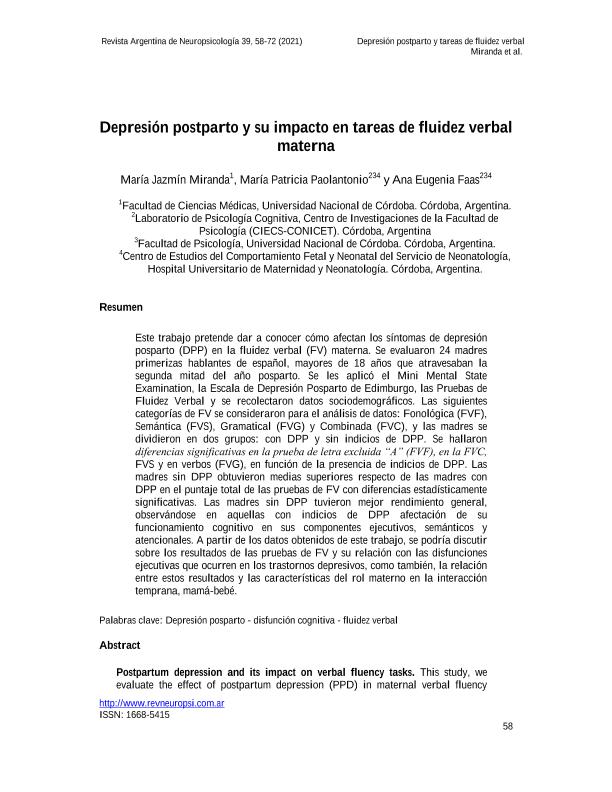Mostrar el registro sencillo del ítem
dc.contributor.author
Miranda, María Jazmín
dc.contributor.author
Paolantonio, María Patricia

dc.contributor.author
Faas, Ana Eugenia

dc.date.available
2022-08-25T15:46:20Z
dc.date.issued
2021-07
dc.identifier.citation
Miranda, María Jazmín; Paolantonio, María Patricia; Faas, Ana Eugenia; Depresión postparto y su impacto en tareas de fluidez verbal materna; Sociedad de Neuropsicología de Argentina; Revista Argentina de Neuropsicología; 39; 7-2021; 58-72
dc.identifier.issn
1668-5415
dc.identifier.uri
http://hdl.handle.net/11336/166613
dc.description.abstract
Este trabajo pretende dar a conocer cómo afectan los síntomas de depresión posparto (DPP) en la fluidez verbal (FV) materna. Se evaluaron 24 madres primerizas hablantes de español, mayores de 18 años que atravesaban la segunda mitad del año posparto. Se les aplicó el Mini Mental State Examination, la Escala de Depresión Posparto de Edimburgo, las Pruebas de Fluidez Verbal y se recolectaron datos sociodemográficos. Las siguientes categorías de FV se consideraron para el análisis de datos: Fonológica (FVF), Semántica (FVS), Gramatical (FVG) y Combinada (FVC), y las madres se dividieron en dos grupos: con DPP y sin indicios de DPP.Se hallaron diferencias significativas en la prueba de letra excluida “A” (FVF), en la FVC, FVS y en verbos (FVG), en función de la presencia de indicios de DPP. Las madres sin DPP obtuvieron medias superiores respecto de las madres con DPP en el puntaje total de las pruebas de FV con diferencias estadísticamente significativas. Las madres sin DPP tuvieron mejor rendimiento general, observándose en aquellas con indicios de DPP afectación de su funcionamiento cognitivo en sus componentes ejecutivos, semánticos y atencionales. A partir de los datos obtenidos de este trabajo, se podría discutir sobre los resultados delas pruebas de FV y su relación con las disfunciones ejecutivas que ocurren en los trastornos depresivos, como también, la relación entre estos resultados y las características del rol materno en la interacción temprana, mamá-bebé.
dc.description.abstract
This study, we evaluate the effect of postpartum depression (PPD) in maternal verbal fluency (FV). Twenty-four first-time Spanish-speaking mothers were evaluated. All of them were over 18 years old and were in the second half of the postpartum year. To study the effect of PPD in verbal fluency, Mini Mental State Examination, the Edinburgh Postpartum Depression Scale, and the Verbal Fluency Tests were applied. In addition, sociodemographic data were collected. The following FV categories were considered to data analysis: Phonological (FVF), Semantics (FVS), Grammatical (FVG), and Combined (FVC), and mothers were divided in two groups: with DPP and without DPP symptoms. Significant differences were found in the excluded letter test “A” (FVF), in the FVC, FVS, and verbs (FVG) between each group. Higher means in the total score of the VF tests was detected in mothers without DPP. Furthermore, a better general performance was observed in mothers without DPP, since, the group of mothers with evidence of DPP showed impairment in their cognitive functioning, and in their executive, semantic and attentional components. Based on the data obtained from this work, one could discuss the results of the VF tests and their relationship with the executive dysfunctions that occur in depressive disorders, as well as the relationship between these results and the characteristics of the maternal role in early interaction, mom-baby.
dc.format
application/pdf
dc.language.iso
spa
dc.publisher
Sociedad de Neuropsicología de Argentina
dc.rights
info:eu-repo/semantics/openAccess
dc.rights.uri
https://creativecommons.org/licenses/by-nc-sa/2.5/ar/
dc.subject
DEPRESIÓN POSTPARTO
dc.subject
DISFUNCIÓN COGNITIVA
dc.subject
FLUIDEZ VERBAL
dc.subject.classification
Otras Psicología

dc.subject.classification
Psicología

dc.subject.classification
CIENCIAS SOCIALES

dc.title
Depresión postparto y su impacto en tareas de fluidez verbal materna
dc.title
Postpartum depression and its impact on verbal fluency tasks
dc.type
info:eu-repo/semantics/article
dc.type
info:ar-repo/semantics/artículo
dc.type
info:eu-repo/semantics/publishedVersion
dc.date.updated
2022-08-23T20:45:11Z
dc.journal.number
39
dc.journal.pagination
58-72
dc.journal.pais
Argentina

dc.journal.ciudad
Buenos Aires
dc.description.fil
Fil: Miranda, María Jazmín. Universidad Nacional de Córdoba. Facultad de Medicina. Escuela de Fonoaudiología; Argentina
dc.description.fil
Fil: Paolantonio, María Patricia. Universidad Nacional de Córdoba. Instituto de Investigaciones Psicológicas. - Consejo Nacional de Investigaciones Científicas y Técnicas. Centro Científico Tecnológico Conicet - Córdoba. Instituto de Investigaciones Psicológicas; Argentina. Universidad Nacional de Córdoba. Facultad de Psicología; Argentina. Universidad Nacional de Córdoba. Facultad de Ciencias Médicas. Hospital Universitario de Maternidad y Neonatología; Argentina
dc.description.fil
Fil: Faas, Ana Eugenia. Universidad Nacional de Córdoba. Instituto de Investigaciones Psicológicas. - Consejo Nacional de Investigaciones Científicas y Técnicas. Centro Científico Tecnológico Conicet - Córdoba. Instituto de Investigaciones Psicológicas; Argentina. Universidad Nacional de Córdoba. Facultad de Psicología; Argentina. Universidad Nacional de Córdoba. Facultad de Ciencias Médicas. Hospital Universitario de Maternidad y Neonatología; Argentina
dc.journal.title
Revista Argentina de Neuropsicología
dc.relation.alternativeid
info:eu-repo/semantics/altIdentifier/url/https://www.revneuropsi.com.ar/numeros-anteriores
dc.relation.alternativeid
info:eu-repo/semantics/altIdentifier/url/https://www.revneuropsi.com.ar/_files/ugd/2c1a84_55ce92ab906d4ebdadc47e744e14e333.pdf
Archivos asociados
